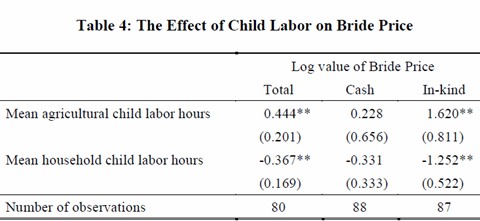
In the midst of researching the economic downsides of bride prices, we came across this recent study from Tanzania, where money always changes hands before a young couple’s nuptials. As noted in the chart above, girls who toil in the fields attract far greater bride prices than peers who stick close to home:
Using an instrumental variables strategy, we show that child labor in agricultural activities is significantly associated with better outcomes in terms of family wealth, particularly for physical assets, land, and bride prices. Although preliminary, our results suggest that agricultural work by children is being positively valued on the marriage market, whereas household child labor work is being penalized.
It’s easy to see why this is the case: agriculture is by far the biggest component of Tanzania’s economy. But if bride prices were abolished, would families be less inclined to put their daughters to work in the fields? That would seem to be a long-term good for a nation looking to decrease its reliance on farming.
More posts on the distorting effects of bride prices soon. In the meantime, here are the arguments for and against the practice.


Jeremy // Apr 15, 2010 at 1:30 pm
Er … why would a country like Tanzania want to decrease its reliance on farming? So that people can work in low paid economies that don’t pay enough to buy the food they could have grown themselves? Or be unemployed and reliant on hand-outs?
Me, I’d like to see the country become more reliant on more effective agriculture.
Brendan I. Koerner // Apr 15, 2010 at 1:40 pm
@Jeremy: I see your point, but I think we can agree that there’s a lot more to an effective agricultural economy than mere manual labor. There is science, logistics, management, communications, etc.—many, many different skills that need to be developed through education. And shouldn’t there be options for people who want an alternate career path? My concern is that girls are being sent to the fields to increase their eventual bride prices, regardless of whether or not they’d like to pursue a different path (notably schooling).
I’m not entirely convinced that abolishing the bride price would end that practice. But it has to have some effect on economic decisionmaking.
Agricultural experience is valuable // Apr 15, 2010 at 5:35 pm
[…] who have worked in the fields are more valuable than women who have worked as housemaids. Brendan Koerner reports on a study of bride prices in Tanzania which shows that “child labor in agricultural […]
Agricultural experience is valuable | Science Report | Biology News, Economics News, Computer Science News, Mathematics News, Physics News, Psychology News // Apr 15, 2010 at 5:54 pm
[…] who have worked in the fields are more valuable than women who have worked as housemaids. Brendan Koerner reports on a study of bride prices in Tanzania which shows that “child labor in agricultural […]